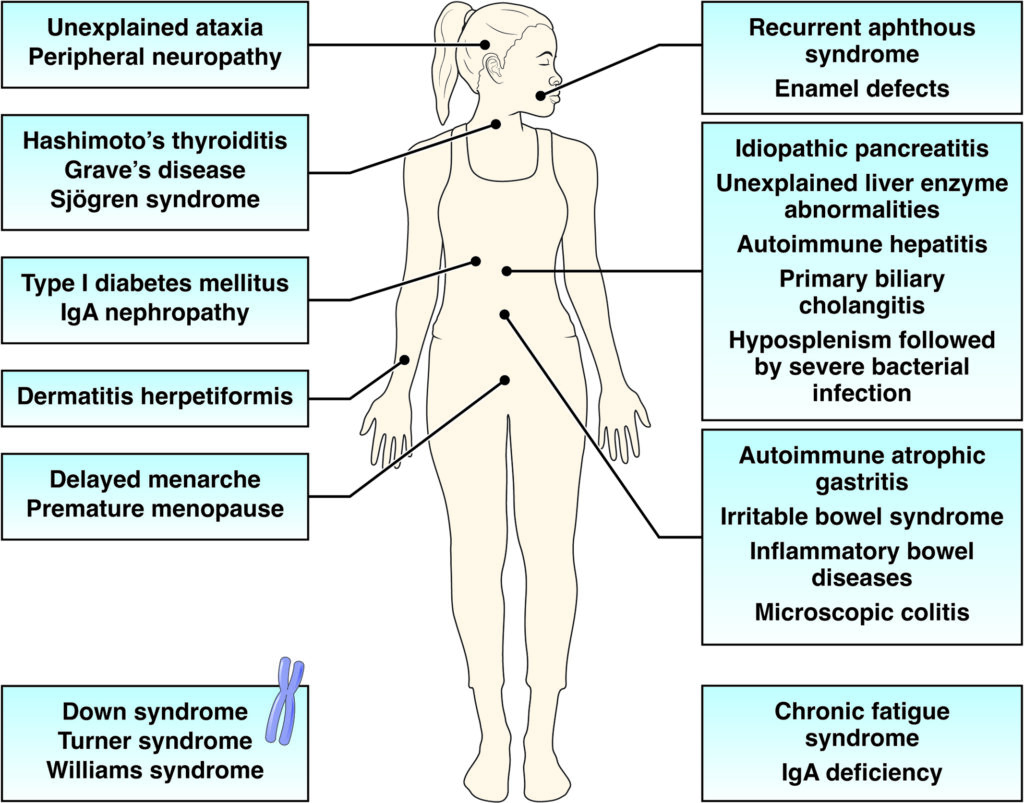Researchers representing five countries (Argentina, France, Italy, Sweden and the U.S.) looked at evidence about testing for celiac disease in patients with more than 30 related diseases and risk factors in a study published in the special celiac disease edition of the AGA journal Gastroenterology.

Though testing for celiac disease is often recommended, the researchers concluded that in some diseases, patients don’t need to be tested unless they have symptoms of celiac disease. They also found strong evidence that patients with these related diseases who have a parent or sibling with celiac disease should be tested even when they don’t have symptoms.
The study recommends repeated testing for celiac disease in patients with Type 1 diabetes because, although Type 1 diabetes often develops in young children, celiac disease can occur later in life.
Overall, screening for celiac disease should be broad, but should focus on identifying patients with symptoms and aggressive cases. At this time, there is no evidence to support mass screening, according to the study.
Of the related diseases and risk factors looked at in the study, researchers found that celiac disease testing is not needed in patients with eosinophilic esophagitis (EoE).
Here are the diseases and conditions for which patients should receive celiac disease testing:
- Life-long condition that happens when the body’s immune system attacks the stomach lining
- Progressive autoimmune liver disorder that can develop into cirrhosis with liver failure
- Testing should be done before starting treatment with steroids or immunosuppressives
- Described by an overwhelming sense of tiredness, lack of energy, and persistent and prolonged exhaustion, even after rest
- More research is needed
- Long-term skin condition that can affect patients with celiac disease
- Only in patients with celiac disease symptoms
- Autoimmune thyroid disease
- Autoimmune thyroid disease
- Spleen becomes too big and doesn’t work correctly
- Only in patients with confirmed hyposplenism and severe bacterial infection
- Common, life-long kidney disease
- Common primary immune defect
- IBD
- Crohn’s disease
- Ulcerative colitis
- Especially in patients who don’t respond to treatment
- In cases of repeated unfavorable pregnancy outcomes, but not for infertility alone
- Swelling and irritation of the large intestine
- At workup
Only if there are other signs of celiac disease
Nerve damage that causes weakness, numbness and pain
Autoimmune disease that causes harm to and eventually destroys bile ducts in the liver
When there are gastrointestinal symptoms or additional risk factors
Autoimmune disease that causes harm to the glands that make moisture in eyes, mouth and other body parts
Genetic disorder in women with missing or abnormal X chromosome
With additional screening at 2 and 5 years after diagnosis and in those who develop gastrointestinal symptoms
Liver isn’t working properly
If you think you may have celiac disease, do not stop eating gluten until you have been tested and the tests show that you have celiac disease. Reducing gluten before testing will change the results.
Support groups
There are a number of support groups for caregivers and patients with celiac disease. Reach out to your gastroenterologist, dietitian, local hospital or community center for more details.
Trusted websites
written by

Amy Ratner
Director of Scientific Affairs
Beyond Celiac

